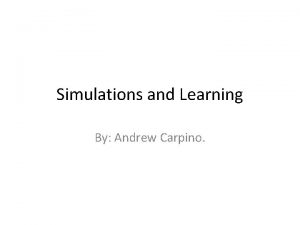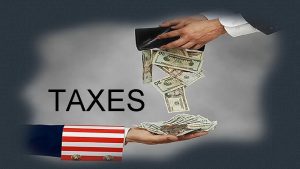Taxes Kirsten Salois Andrew Carpino Alexander Malm Timothy











- Slides: 11

Taxes Kirsten Salois, Andrew Carpino, Alexander Malm, Timothy Rose

Taxing for the General Welfare • The Congress shall have Power To lay and collect Taxes, Duties, Imposts and Excises, to pay the Debts and provide for the common Defense and general Welfare of the United States • interpreted as granting the state broad power to legislate or regulate for the general welfare that is independent of other powers specified in the governing document

U. S. V Butler (1936) • Struck down AAA (Agricultural Adjustment Act). • Madison interprets “general welfare” as constitutional duties of congress. • Hamilton interprets “general welfare” as welfare of the people of the US. (Adopted by court).

Steward Machine v. Davis (1937) • Allows for the laying of a tax (excise) on businesses consisting of eight or more employees in order to provide unemployment relief for the United States (so long as such as tax is geographically uniform) • Includes Unemployment relief as a part of providing for the General Welfare of the United States. • States may join a collective to provide for unemployment relief, so long as they are free to leave at any time.

Helvering v Davis (1937) • A employer is merely a withholding agent with respect to the employee tax, neither an employee or employer may ask for relief from the employee tax • lays foundation that people can not get away from paying certain taxes that go to the general treasurery

Direct Taxes • Article I, section 9 "No Capitation, or other direct, Tax shall be laid, unless in Proportion to the Census or Enumeration herein before directed to be taken. " • Because of that apportionment requirement, application of "direct tax" as it related to specific taxes has been considered by the Supreme Court in the 18 th, 19 th, and 20 th centuries, • led to the adoption of the 16 th Amendment.

Hylton v. US (1796) • Taxation on goods is not a direct tax • Case lead to the expansion of sales tax • Also lead to business related taxes

Veazie Bank v. Fenno (1869) • Act: "That every National Banking association, State bank, or State banking association, shall pay a tax of ten per centum on the amount of notes of any person, State bank, or State banking association, used for circulation and paid out by them after the 1 st day of August, 1866, and such tax shall be assessed and paid in such manner as shall be prescribed by the Commissioner of Internal Revenue. " • The court reasoned that the Constitution from which the people ratified and agreed upon grants Congress the right to provide revenue by the taxation of persons and property • taxation which Congress is implementing must uniform throughout the United States

Springer v. US (1880) • Spring refused to pay income tax and as a result his property was seized and sold • The Federal income tax imposed under the Revenue Act of 1864 was constitutional. • Alexander Hamilton saying; "Those of the direct kind, which principally relate to land buildings, may admit of a rule of apportionment. Either the value of the land, or the number of the people, may serve as a standard. ”

Pollock v. Farmer’s Loan & Trust Co. (1895) • Wilson-Gorman Tariff Act of 1894 imposed a 2% income tax on any revenue over $4, 000 generated by persons or corporations • Massachusetts citizen Charles Pollock sued Farmer's Loan and Trust in order to keep them from paying the tax • Pollock argued that the act was unconstitutional because the federal government did not have the right to impose unapportioned taxes • The Supreme Court ruled that the unapportioned taxes that the Wilson-Gorman Tariff Act imposed were unconstitutional

Flint v. Stone Tracy Co. (1911) • In 1909, Congress passed the Corporation Tax Act that imposed a 1% tax on any revenue over $5, 000 that a corporation generated • Stella Flint, the custodian of Samuel N. Stone's estate, argued that incorporating a company was a state function, and therefore could only be taxed by the state • The Supreme Court ruled that operating in corporation form is a privilege, and therefore is eligible to be taxed by the federal government • The Court reasoned that the tax was an excise tax, not a direct tax, and therefore was legal under Article I of the Constitution





















